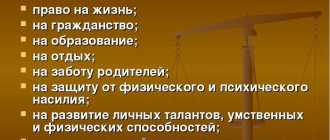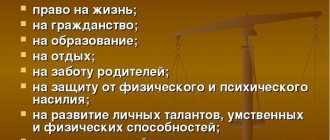Responsibilities of parents to raise children
The rights and responsibilities of parents in the upbringing and education of children are regulated not only by domestic legislation, but also by the UN International Convention on the Rights of the Child.
Any person tries to convey to his child the simple truth that he must be responsible for his actions and actions. True, often even parents forget that they must bear their own responsibility for their own children, and deliberately shift personal responsibilities to teachers, educators or the children themselves.
Article 63 of the RF IC discusses the main responsibilities of parents that relate to the upbringing and educational processes. In accordance with the established provisions, parents are responsible for the upbringing of minors. Therefore, first it is necessary to clarify what the term “parental responsibility for upbringing” itself includes. This concept consists of several main points:
- Caring for the comprehensive development of the child, and in particular, in the spiritual, psychological and physical aspects. Parents undertake to provide the child with the opportunity to receive a general education, and all children are required to attend educational institutions;
- Protecting the interests of the child. Parents act as official representatives of the interests of their own child before the law. Therefore, when the need arises, they are obliged to defend his interests and protect his rights;
- Security. In accordance with this point, parents must provide the child with a safe environment for development and life, without using physical punishment and moral pressure as tools of control;
- Financial support for the child. Until the child reaches the age of majority (18 years), the parents are obliged to support him;
- Child education. In this category, special attention should be paid to the responsibility of parents for the behavior of their children, since their educational process will subsequently be reflected in the child’s behavior not only in the family, but also in society.
The Convention on the Rights of the Child, as well as internal regulations of Russian legislation, stipulate that the primary responsibility for raising children lies with the parents, and the interests of the child must come first for his father and mother.
If it is established that the duties of the parents are not fulfilled properly or that there is a violation of the rights of the child, then in this situation the responsibility of the parents may become legal. Almost every segment of the law has provisions that regulate the responsibility of parents to their children:
- Civil legal framework (Article 1073-1075 of the Civil Code of the Russian Federation);
- Administrative law (Article 5.35 of the Code of Administrative Offenses of the Russian Federation);
- Family law (Article 69, 73 of the RF IC);
- Criminal legislation (Article 156 of the Criminal Code of the Russian Federation).
The provisions and standards listed above provide for measures of parental responsibility for improper performance of personal responsibilities in relation to their own children.
Consideration of communications by the Committee
By resolution of the UN General Assembly of December 19, 2011, the Optional Protocol to the Convention on the Rights of the Child was adopted, which regulates the consideration of communications by the Committee. A communication is a complaint by a person about actions of his state that violate the rights provided for by the Convention. The Committee considers a communication if it meets the following conditions:
- not anonymous;
- in writing;
- compatible with the requirements of the Convention and protocols;
- the issue raised has not yet been considered by the Committee or through another procedure of international settlement;
- sufficiently justified;
- all government remedies have been exhausted, or it is obvious that the provision of assistance is being delayed;
- the report came within a year of domestic remedies running out.
The Committee considers received messages at meetings. He then forwards his views to the State against which the complaint was made. The basic principle of conflict resolution is an amicable settlement of a dispute based on respect for the obligations established by the Convention. If there is a risk of irreparable harm to the victim of the violation, the Committee may request the State to introduce provisional measures. Such a request may be made even before a decision on the complaint is made.
The right of parents to educate their children
An important component of the educational process, as a result of which a child is formed as a person, is his receipt of general education. The responsibility of parents to ensure their children the right to receive a quality education is enshrined in the Constitution of the Russian Federation (clause 4 of article 43).
In accordance with paragraph 2 of Article 63 of the UK, a constitutional norm was legitimized regarding the current responsibilities of parents to ensure that their descendants receive a general education. In addition, it is assumed that education must necessarily ensure the formation in every child of an adequate picture of the world, which corresponds to the modern level of knowledge. This will help shape the child’s personality and provide modeling of a behavioral model that will be acceptable not only for the family, but also for society as a whole.
Education itself is directly aimed at achieving such main goals as:
- Personality development and the formation of normal child behavior in society;
- Development of personal talents and recognition of the child’s abilities;
- Instilling in a child the concept of respect for human rights and fundamental personal freedoms;
- Forming a respectful attitude towards the culture and traditions of not only your country, but also all countries of the world;
- Development of a normal respectful attitude towards basic legal norms;
- Preparing the child for a conscious life in terms of mutual equality and respect;
- Thrifty attitude towards nature.
General education is compulsory, and if parents are unable to ensure the fulfillment of this right, then in accordance with current legislation they may be held liable. It is worth clarifying that the right of parents to choose an educational program is considered unquestionable. Consequently, it is the parents who decide how their children will receive general education - in special educational institutions or at home.
Rights specified in the act
Conventionally, all the rights that children have and which are enshrined in the above document can be divided into 4 large groups.
Fundamental rights of the child under the Convention
Development Rights
This category of rights promotes and is aimed at the development of the individual and helps to reveal his potential. As an example, the following rights can be given:
- education;
- participation in public events;
- religious preferences;
- receiving the information.
Rights giving protection
This category of rights guarantees children protection from violence and exploitation. As an example, the following rights can be given:
- protection from violence and bodily harm;
- non-participation in armed conflicts;
- inadmissibility of use and operation;
- protection from labor exploitation.
Rights associated with participation
That is, those that secure equal rights to participate in the life of society. For example, the following rights to:
- formulating your own opinion;
- participation in associations;
- participation in solving problems related to solving issues related to their life and development.
Rights to life
These include the following:
- decent housing;
- provision of food;
- receiving proper medical care.
Transferring a child to other relatives
The main responsibility of any parent is to ensure the educational and educational process for their own children. If for some reason the parents do not ensure the observance of the child’s rights, then they may be deprived of them, and the child will be transferred to the responsibility of close relatives who will act as guardians, foster families or the state.
According to the law, the transfer of a child to be raised by other relatives can only be carried out in relation to those children who were left without guardianship and trusteeship from their own parents. Often, this arises in situations where parents have been deprived of their existing parental rights, or for some reason are unable to fulfill their obligations towards the child.
The biological parents have the priority right to raise a child. And if they are deprived of this right, then the responsibility for raising and educating children can be assigned to their closest relatives, but only with their written consent and permission from the guardianship and trusteeship authorities.
If the child is currently being transferred to relatives for upbringing, then it is worth understanding that the fundamental rights and freedoms of the child do not disappear anywhere, and all responsibilities in relation to the minor will be transferred to his guardians.
Regarding the issue of material support, when transferring a child to close relatives, they are responsible for the full provision and maintenance of the child. However, according to the law, guardians have the right to receive financial assistance from the state.
It is worth noting that the transfer of a child to another family cannot be done unilaterally. This is possible only at the request of the guardianship and trusteeship authorities, at the written request of the guardians and with the help of the courts. It is the court that will make the final decision and confirm the transfer of parental responsibilities to the guardian.
Medical support
As for health protection, the rights of the child in the Constitution of the Russian Federation also contain clauses regarding health protection. They state that every minor has all rights and freedoms in the field of medical care. He can:
- Get treatment and observation at a dispensary.
- Take advantage of preferential conditions for food and medical care.
- Receive information about his/her health status in a form that, according to the protection of children's rights, is accessible to his/her age.
- Study and work in conditions that exclude the adverse effects of various factors on his health.
What is very important, the protection of children’s rights in the Russian Federation allows minors who have reached the age of 15 to voluntarily agree or refuse medical intervention in writing.
Healthcare costs in the Russian Federation.
Convention on the Rights of the Child
The UN Convention on the Rights of the Child is a specialized legal document that plays an international role and predetermines the rights of minor children that must be guaranteed in the countries participating in the signing of the document. All UN countries except the United States took part in the document signing process. The UN Convention on the Rights of the Child is a basic normative act that covers the full range of legal guarantees for minors.
The UN Convention on the Rights of the Child includes 54 articles that detail the individual freedoms and rights of all citizens, whose ages can range from birth to 18 years (the age of majority may vary in different countries).
The UN Convention on the Rights of the Child, its first part, completely deciphers the concept of the word “child”, and also regulates the primacy of interests and basic rights and freedoms of children. The second part of the document, the UN Convention on the Rights of the Child, clarifies the features of the structure and functions of the Committee on the Rights of the Child, and also entrusts state bodies with the task of implementing the decisions of this institution. The third part of the UN Convention on the Rights of the Child sets out ways to resolve various procedural legal problems by public authorities that arose in the process of applying the articles of this document.
The UN Convention on the Rights of the Child was drafted in accordance with basic democratic principles, including:
- Absence of any kind of discrimination. The UN Convention on the Rights of the Child prohibits neglect of a child on various individual grounds: nationality, language, religious preferences, ethnic origin and social status, health status, political views and personal preferences;
- Supremacy of interests. The UN Convention on the Rights of the Child regulates the observance of the interests of minors in the process of making any decisions that affect the lives of children;
- The highest quality of life, development and protection. Society and government agencies must guarantee minors the full realization of their physical, social and spiritual potential;
- Every possible participation in the life of the younger generation: parents, adult citizens and government authorities must constantly participate in making any decisions, as well as ensure that opinions are taken into account when deciding the future fate of young citizens.
The UN Convention on the Rights of the Child guarantees minors the opportunity to receive free basic education. To implement the goals of the document, government bodies of the participating countries must develop various types and levels of the educational system. The UN Convention on the Rights of the Child also includes articles on raising children in the family. The process of raising children must be controlled by parents or legal guardians, who must fully comply with all the requirements and interests of the child.
The international convention, which clarifies the basic rights and freedoms of children from the countries participating in the signing of the document, is an innovative solution to the problem of the full realization of the younger generation. Many of the rights in this document were introduced for the first time, so compliance with the basic articles of the convention ensures the full development of the personal and physical qualities of children, worthy education of respect for society and the environment.
Purpose of the international document
The main goal of the Convention - namely, ensuring maximum protection of the rights, freedoms and interests of children - was repeatedly named in the documents that predetermined its creation. Among such documents are the Geneva Declaration of the Rights of the Child, which was adopted in 1924; Declaration of the Rights of the Child, Declaration of Human Rights and others.
In addition, the purpose of creating the Convention as an international document is its recognition by all countries that are members of the United Nations. For countries that have signed the Convention, it has the status of law.
General compulsory education
In accordance with the main constitutional norms and basic legislative provisions, all citizens of Russia have the right to receive general education. This right comes to everyone in childhood, and must be ensured by the child’s parents.
In accordance with the Law “On Education in the Russian Federation,” primary, basic and secondary education is considered compulsory. Thus, in accordance with this standard, all children are required to go to school and receive a general education, and their parents are obligated to monitor the implementation of this right.
At the same time, the law provides that it is parents who have the right to decide how their children will receive the basics of education. According to the decision of the parents, the child can receive education at home or in public or private educational institutions. It is worth noting that home schooling must be agreed upon with the guardianship authorities so that no difficulties arise in the future.
Author of the article
Basic provisions
The convention consists of three parts. Basic information about children's rights is in the first part.
States Parties take all measures to implement children's rights in this Convention and provide protection and care. The main responsibility falls on parents in raising and developing their children.
The document in its first articles reveals the concept of “child”. This is a person who is under 18 years of age (with the exception of children who have reached the age of majority before this age according to the law of the state party). The concept also includes any minor, regardless of gender, race, language, skin color, religion, political and other beliefs.
It is necessary to know the rights to protect every minor. The articles indicate the rights:
- for life and healthy development;
- on the name, citizenship, as well as on the knowledge of the parents and their care;
- on individuality;
- the right not to be separated from parents, except when necessary for the good;
- cross borders if children and parents live in different countries;
- on your own views, regardless of age;
- freely express opinions if there is no harm to the state and society;
- to freedom of religion;
- to freedom of association and assembly, if this does not violate security;
- to life free from arbitrary and unlawful interference;
- to free access to information aimed at spiritual and moral well-being, as well as physical and psychological development;
- (education should develop personality and talents);
- enjoy the culture, religion and language of ethnic, religious and linguistic minorities;
- for rest and leisure, cultural and creative activities.
It is worth noting that participating states protect children from a number of difficulties: exploitation and dangerous work, the use of narcotic and psychological substances (production and trade), any form of sexual activity, abduction, trafficking, as well as torture and ill-treatment.
There is special protection for some specific persons, such as refugees, children with physical and psychological disabilities, children in care and adopted children.
If children themselves have committed an offense, they have the right to be treated humanely by any person. When deprived of liberty, they must have access to legal assistance and the opportunity to contact their family.










